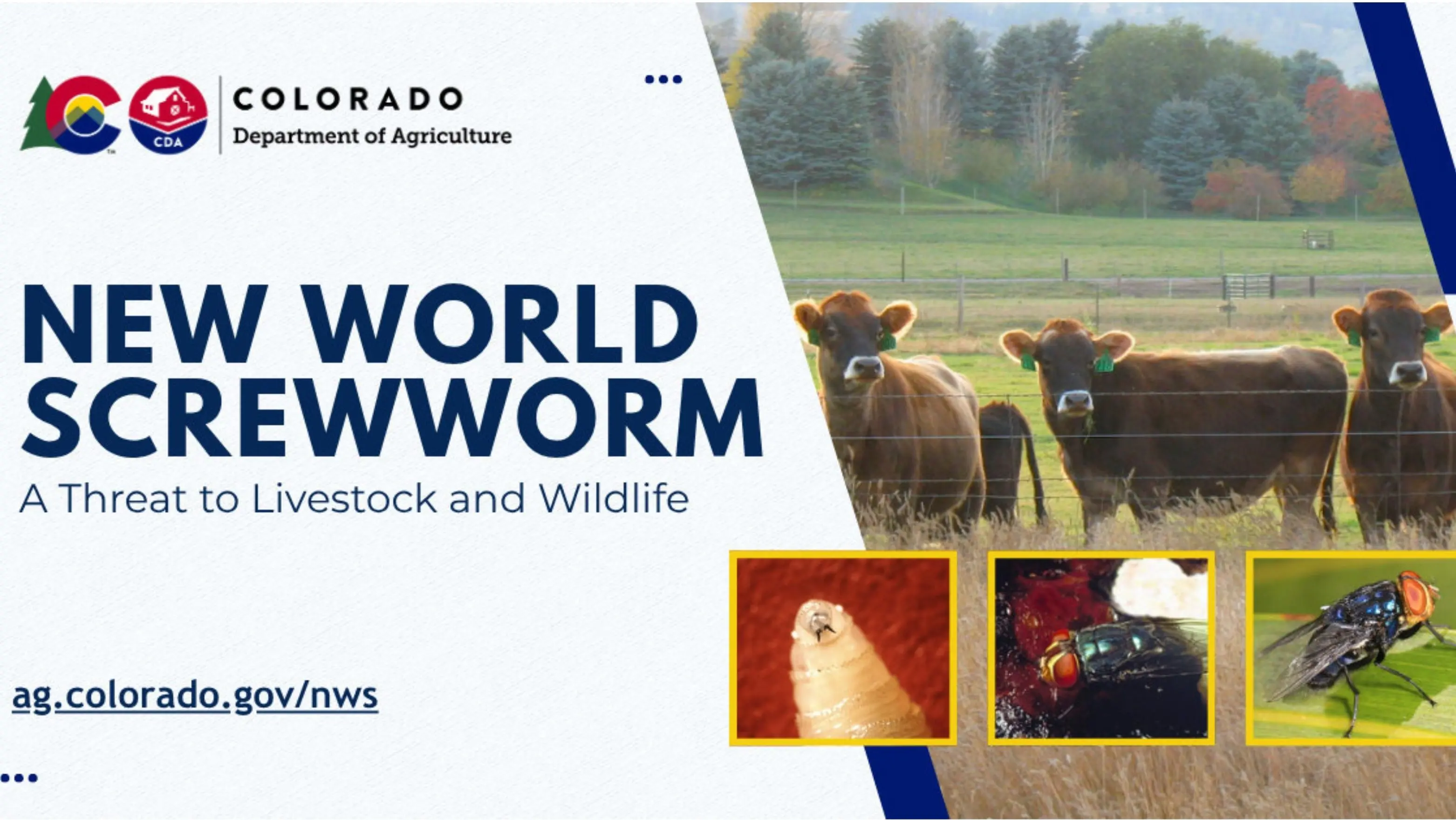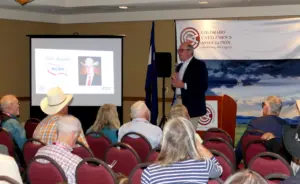
By Shannon Lukens.
Livestock and poultry owners are being reminded to monitor their animals for symptoms of New World Screwworm (NWS) and Highly Pathogenic Avian Influenza (HPAI). The Colorado Department of Agriculture is sending information about cases detected in Mexico, close to the Texas border, and then bird flu detected in wild birds in Colorado. Veterinarians are being advised to contact the State Veterinarian’s office immediately if they suspect a case.
At the Colorado Cattlemen’s meeting in Steamboat Springs this summer Colin Woodall spoke about the New World Screwworm Fly. Woodall is the CEO of the National Cattlemen’s Beef Association. He confirmed that the New World Screwworm Fly is a non-native and flesh-eating. The USDA says it is a “devastating pest.”

“This is a problem because if not treated, it could kill your cattle in seven to ten days and have a tremendous impact on your bottom line, so that’s why we’re watching, in order to protect ourselves from this pest.”
Detections of Highly Pathogenic Avian Influenza in Wild Birds
Please see the CDA Screwworm webpage for additional information.
Press Release from the Colorado Department of Agriculture and Colorado Department of Public Health and Environment; Oct. 16, 2025.
State Veterinarian Urges Livestock, Poultry Owners to Monitor for Disease
Broomfield, Colo. — The Colorado Department of Agriculture (CDA) is urging livestock and poultry owners to remain vigilant and monitor their animals for symptoms of New World Screwworm (NWS) and Highly Pathogenic Avian Influenza (HPAI). Recent detections of NWS in Mexico, close to the Texas border, and an increase in HPAI cases across the nation, including wild bird detections in Colorado, highlight the importance of preparedness and prompt reporting. There are currently no known cases of screwworm in Colorado or the United States.
“The recent detections of New World Screwworm in northern Mexico underscore the critical need for continued vigilance in surveillance and reporting,” said Dr. Maggie Baldwin, Colorado State Veterinarian. “We have been working on a comprehensive New World Screwworm response plan for Colorado, and we are prepared to coordinate with local, state, and federal agencies to implement measures such as quarantine, treatment, movement restrictions, and sterile insect technique if a case is detected.”
For NWS, veterinarians are advised to contact the State Veterinarian’s office immediately if they suspect a case. Key steps include inspecting animals traveling internationally, carefully documenting suspected myiasis infestations with photos and videos, recording travel history, and saving larvae for testing in 70% ethanol or isopropyl alcohol. Please see the CDA Screwworm webpage for additional information.
Regarding HPAI, the recent increase in detections across the nation and among wild birds in Colorado signals the start of migration season, during which migrating birds act as a reservoir for the disease. While Colorado has not seen domestic poultry detections since March, there have been multiple detections of HPAI in wild birds across the state this fall: an owl, three turkey vultures, and two red-tailed hawks in Larimer, Weld and Gunnison counties. These wild bird cases indicate the virus is circulating in the central flyway and are a reminder that poultry owners should implement strict biosecurity measures to protect their flocks during this migration season.
“The detections of HPAI in wild birds in Colorado are similar to reports from other wildlife agencies in nearby states and provinces,” said CPW State Wildlife Veterinarian Dr. Peach Van Wick. “CPW relies on public observation and reporting of sick or dying wild birds and urges the public to contact their local CPW office to report suspect cases.”
Colorado has not had any human cases of HPAI since the summer of 2024.
“The Colorado Department of Public Health and Environment (CDPHE) is committed to working closely with CDA and other partners to ensure the safety of Coloradans,” said Dr. Allison Kohnen, State Public Health Veterinarian. “It’s important to avoid contact with sick or dead wildlife without the proper personal protective equipment (PPE).”
HPAI in poultry, dairy cattle, or other livestock species must be reported directly to the State Veterinarian’s Office. Suspected HPAI feline cases can be reported to CDPHE, and they will share that information with CDA. A delay in reporting can lead to a delay in necessary response measures which can compromise human and animal health. For more information on HPAI, please see our CDA HPAI landing page.
La Veterinaria estatal urge a dueños de ganado y aves de corral a estar atentos a las enfermedades
Broomfield, Colorado — El Departamento de Agricultura de Colorado (CDA) urge a los propietarios de ganado y aves de corral a permanecer atentos y monitorear a sus animales para detectar síntomas del gusano barrenador del Nuevo Mundo (NWS) y la influenza aviar altamente patógena (HPAI). Las recientes detecciones de NWS en México, cerca de la frontera con Texas, y el aumento de los casos de gripe aviar altamente patógena en todo el país, incluidas las detecciones en aves silvestres de Colorado, ponen de relieve la importancia de la preparación y la notificación inmediata.
“Las recientes detecciones del gusano barrenador del Nuevo Mundo en el norte de México subrayan la necesidad crítica de mantener la vigilancia y la presentación de informes,” dijo la Dra. Maggie Baldwin, veterinaria del estado de Colorado. “Hemos estado trabajando en un plan integral de combate al gusano barrenador del Nuevo Mundo para Colorado, y estamos preparados para coordinar con agencias locales, estatales y federales para implementar medidas como cuarentena, tratamiento, restricciones de movimiento y la técnica de esterilización de insectos si se detecta un caso.”
Para el gusano NWS, se recomienda a los veterinarios que se comuniquen con la Oficina Veterinaria del Estado de inmediato si sospechan de un caso. Los pasos clave incluyen inspeccionar a los animales que viajan internacionalmente, documentar cuidadosamente las infestaciones sospechosas de miasis con fotos y videos, registrar el historial de viajes y guardar las larvas para analizarlas en etanol al 70% o alcohol isopropílico. Consulte la página de CDA del gusano barrenador para obtener información adicional.
En cuanto a la IAAP, el reciente aumento en las detecciones por todo el país y entre las aves silvestres de Colorado señala el inicio de la temporada de migración, durante la cual las aves migratorias actúan como reservorio de la enfermedad. Colorado no ha visto detecciones de aves de corral domésticas desde marzo, pero han habido múltiples detecciones de IAAP en aves silvestres en todo el estado este otoño: un búho, tres buitres y dos halcones de cola roja en los condados de Larimer, Weld y Gunnison. Estos casos en aves silvestres indican que el virus está circulando en la ruta migratoria central y son un recordatorio de que los propietarios de aves de corral deben implementar medidas estrictas de bioseguridad para proteger sus aves durante esta temporada de migración.
“Las detecciones de IAAP en aves silvestres en Colorado son similares a los informes de otras agencias de vida silvestre en estados y provincias cercanas,” dijo la veterinaria de vida silvestre estatal de CPW, la Dra. Peach Van Wick. “CPW se basa en la observación pública y los informes de aves silvestres enfermas o moribundas e insta al público a comunicarse con su oficina local de CPW para reportar casos sospechosos.”
Colorado no ha tenido ningún caso humano de IAAP desde el verano de 2024.
“El Departamento de Salud Pública y Medio Ambiente de Colorado (CDPHE) se compromete a trabajar en estrecha colaboración con CDA y otros socios para garantizar la seguridad de los habitantes de Colorado,” afirmó la Dra. Allison Kohnen, veterinaria de salud pública del estado. “Es importante evitar el contacto con animales salvajes enfermos o muertos sin el equipo de protección individual (EPP) adecuado.”
La IAAP en aves de corral, ganado lechero u otras especies de ganado debe notificarse directamente a la Oficina Veterinaria del Estado. Los casos sospechosos de IAAP en felinos se pueden informar al CDPHE, y ellos compartirán esa información con CDA. Un retraso en la notificación puede dar lugar a un retraso en las medidas de respuesta necesarias, lo que puede comprometer la salud humana y de animal. Para obtener más información sobre la IAAP, consulte nuestra página de inicio sobre IAAP de CDA.
###